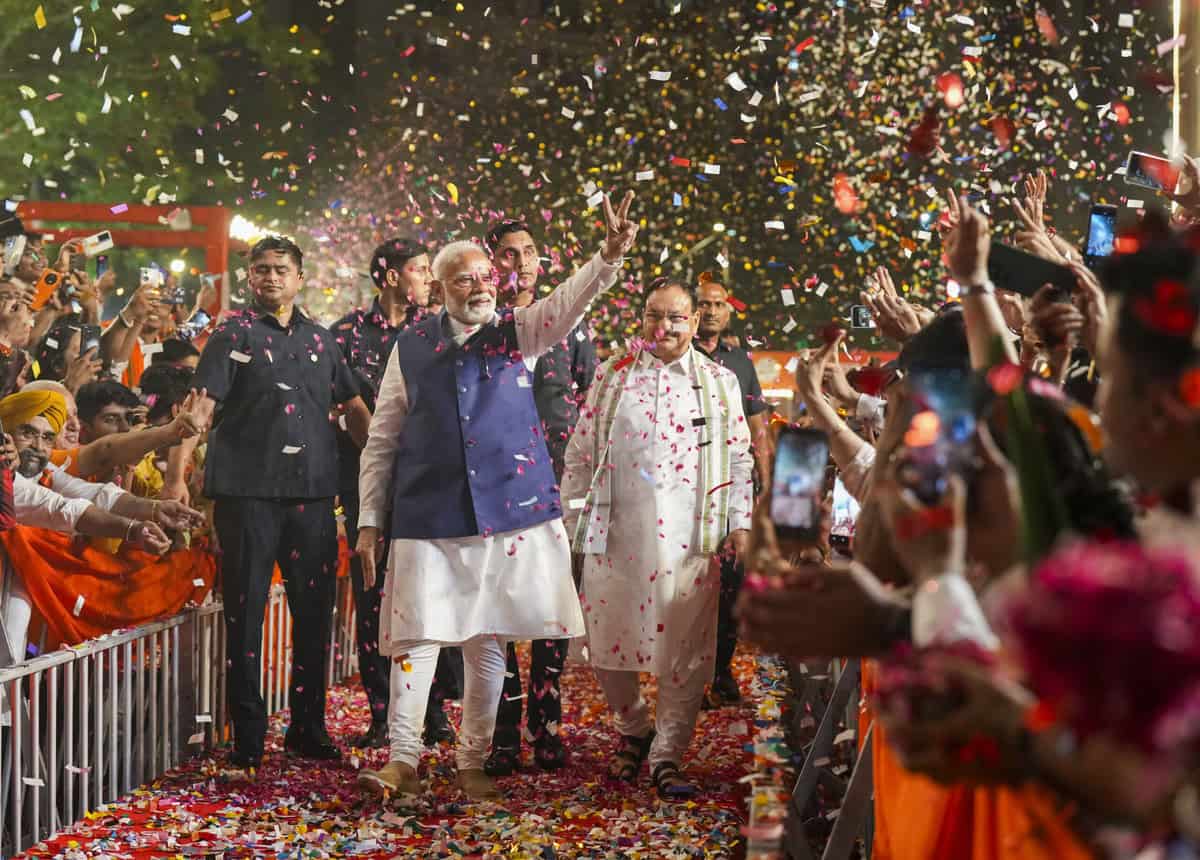
New Delhi: Against the dominant narrative of a Congress comeback, the BJP has pulled off a historic third term on the trot in Haryana, a feat that will reinvigorate the ruling party cadres and could deal a debilitating blow to the Congress looking for further ascendency after its improved show in the Lok Sabha polls.
A stunning victory in Haryana coupled with its best-ever show in Jammu and Kashmir is bound to blunt detractors’ claim that the BJP’s grip was loosening over its supporters and brings into sharp focus its organisational efficiency and its leadership’s keen ability to redraw strategy in line with the changing ground dynamics.
As the party prepares to fight other challenging state elections in Maharashtra and Jharkhand in a few weeks, this win will provide it much-needed momentum. It will bolster its hopes of another come-from-behind victory, more so in the western state as the opposition INDIA bloc had inflicted a big defeat on the BJP-led alliance in the Lok Sabha elections.
It was also an election in which the BJP worked in cohesion with its ideological mentor Rashtriya Swayamsevak Sangh (RSS), whose functionaries have been keenly involved in the party’s strategy sessions across states following suggestions of some drift in their ties during the parliamentary elections.
Often seen to be on the defensive when it has to battle local issues and caste factors, BJP leaders noted that the party successfully turned the tables on the Congress in Haryana by projecting the polls as a contest between “parchi and kharchi” government led by Bhupinder Singh Hooda between 2004-14 and its “clean” administration since 2014.
“One of our successes was that we succeeded in changing the poll narrative of the Lok Sabha polls,” a BJP leader not willing to be named said.
With Hooda’s influence dominant in the state Congress and the party’s other satraps like Kumari Selja pushed to the background, the BJP upped its ground game as its leaders, including poll in-charge and Union minister Dharmendra Pradhan, held meetings with various communities and successfully tapped in the state’s traditional faultline of Jat versus non-Jat politics.
The resentment of vocal Jats and a section of Dalits with the BJP dominated the narrative but the results demonstrated that the relatively muted majority of Other Backward Classes and poorer sections of Dalits besides the “upper castes” rallied behind the ruling party.
The party’s decision to replace Manohar Lal Khattar with an OBC chief minister and more affable Nayab Singh Saini also seems to have paid off. BJP leaders involved in the polls said they successfully won back a section of Dalits who had voted against the party in the Lok Sabha polls.
Though Modi’s public campaign was relatively sedate as he held merely four rallies, he drew the battle lines with a focus on corruption, nepotism and casteism under the Congress, highlighting the controversial land deals involving the “damaad” (Robert Vadra) during the Congress’s rule and the politics of “bapu-bete”, a swipe at Hooda and his MP son Deepender Singh Hooda.
With the party defying all predictions to repulse the challenge from a resurgent Congress, another BJP leader said their win will lay to rest “all the chatter” about the party’s falling political stock following its below-par Lok Sabha election performance.
The Election Commission projected that the BJP had either won or was leading in 49 seats in the 90-member assembly. If the tally holds fast, it will be its best-ever performance in the state.
Though the Congress increased its vote share by a massive 11 percentage points, its overall share of over 39 percent was still slightly behind the 39.89 percent of the BJP, which also made gains on its support in the 2019 polls.
The figures may change once the EC puts out the final data.
In Jammu and Kashmir, the BJP’s expectations of having a say in the government formation suffered a setback despite its record tally of 29 seats as the National Conference-Congress alliance clinched a majority in the 90-member UT assembly.
However, its strong show underscored that it continues to face no political threat in its catchment area in the Union Territory, with the Congress unable to mount much of a challenge in the Jammu region.
Jharkhand assembly elections are also expected to be held along with the Maharashtra polls, and the BJP brain trust, including Modi, home minister Amit Shah and party president J P Nadda, have been crisscrossing the state to sharpen the party’s governance and political agenda.
